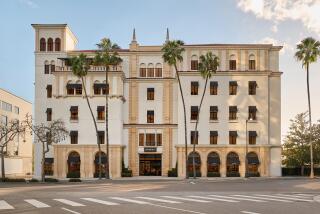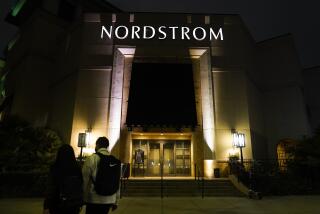Marcus Family Severs Ties as Neiman Names New CEO
- Share via
Allen I. Questrom, the highly regarded former chairman of Bullock’s and Bullocks Wilshire, on Friday was formally named president and chief executive of Neiman Marcus, the prestigious Dallas-based specialty store chain.
At the same time, Richard C. Marcus, grandson of one of the chain’s co-founders, announced his resignation as chairman and chief executive. The departure of Marcus, 50, severs the family’s affiliation with its well-known store and, industry observers noted, marks the end of an era of family management of well-known national chains.
Questrom, 48, will assume his posts Sept. 7. As president, he fills a post vacated last November by David Dworkin, who left in a contract dispute. Questrom will report to Robert J. Tarr Jr., president and chief operating officer of Neiman-Marcus Group and of General Cinema Corp., a leading soft-drink bottler and movie exhibitor that owns 60% of Neiman-Marcus Group.
The post of chairman of the Neiman Marcus chain, which has 8,630 employees, will go unfilled for now, a General Cinema spokeswoman said.
In a meeting Friday morning with about 400 employees at the downtown Dallas flagship store, Richard Marcus and Questrom both sounded upbeat about the change, spokeswoman Pat Zajac said.
“As our search for president matured, I realized we had an opportunity to bring in a great leader in retailing such as Allen Questrom,” Marcus was quoted as telling the assemblage. “This presented me with a unique opportunity.
“After 26 years in the business, 15 as a principal in the company and 10 as CEO, I felt it was an ideal time to pass the baton on to someone of Allen’s stature. . . . After counseling with my wife, (Heather), we decided to go on to other things.” The employees gave Marcus a five-minute standing ovation.
Marcus then introduced Questrom, who gave the group a short pep talk. “Neiman Marcus has stood for the same thing over the last 81 years. There has been a consistency which is lacking in other companies. Let’s go on to make this the greatest specialty store in the world.”
Given the Marcus family’s ties to Dallas and the community’s affection for the chain, Questrom seems suited for coping with a potentially difficult situation as he takes the helm. He will be overseeing an extensive remodeling and renovation program as well as an ambitious plan to open 10 to 12 new stores by 1995. The chain now has 22 stores in 19 cities.
Although regarded as a strong-minded executive, Questrom is popular and personable and has a laid-back side. In 1984, after six years as chief executive of Rich’s department store in Atlanta, he took 10 months off for a round-the-world skiing sabbatical with his wife, Kelli.
He then was named chairman of Bullock’s and Bullocks Wilshire and won high marks for putting the store into the forefront of department store merchandising in Southern California. Last January, he became vice chairman of the stores’ parent company, Federated Department Stores.
After Federated was bought by Campeau Corp., the Toronto development company, Questrom left in May with a lucrative financial package. Since then, he has taken bicycling trips in Europe and other vacations while being courted for executive positions by both Robert Campeau and the House of Fraser in London and reportedly attempting to put together funds to buy part of the Robinson’s chain from May Department Stores.
Robert Kerson, president of Walter K. Levy Associates in New York, said his executive placement and consulting firm started recruiting Questrom for the Neiman posts about four months ago.
“It’s a good marriage all around,” Kerson said. “There are not too many assignments at this level that come open on a regular basis.” As for the possibility that Questrom might later move to a high-level post at General Cinema, Kerson said: “Allen’s first hurdle is to do this job and do it well.”
Kurt Barnard, publisher of the Retail Marketing Report newsletter in New York, said Questrom is “in his element. . . . Neiman Marcus has for quite a few years now been coasting on its brilliant reputation of exclusivity and extravagant fancifulness. With his far-reaching experience, Questrom can really help Neiman Marcus recapture the past glory.”
Questrom, a Boston native, was graduated from Boston University in 1964. General Cinema is based in the Boston suburb of Chestnut Hill.
Harry E. Wells III, an analyst who follows General Cinema for the Adams, Harkness & Hill brokerage in Boston, said Neiman Marcus has been “in a downhill slide for a couple of years.” He noted that it is difficult to compute reliable results for the company since its spinoff from Carter Hawley Hale Stores of Los Angeles last summer.
But by his estimate, Neiman-Marcus Group made about $30 million on sales of $1.22 billion for the year ended in July, with the Neiman chain accounting for 75% to 80%. The profit figure is well below General Cinema’s target of at least $100 million in profits on that level of sales, Wells said.
Admitted Weakness
Sources in the industry said Marcus has not yet decided what he will do. In his years as Neiman’s chief, Marcus was regarded as a calm, logical and controlled administrator. By his own acknowledgment, he was not strong as a merchant.
Knowledgeable sources speculated that that weakness led to his departure. When General Cinema went looking for a replacement for Dworkin, many strong candidates said they would not take the post of president without also being named chief executive.
As a result, the sources said, General Cinema told Marcus that it was prepared to risk losing him as chief executive. The company reportedly tried to persuade him to stay as president but Marcus chose not to “live out a charade,” one source said.
From its founding in 1907, Neiman Marcus had the goal of dressing its customers elegantly, according to the folksy 1953 history “Neiman-Marcus, Texas,” by Frank X. Tolbert. “Any fine store can dress a few women beautifully,” co-founder Herbert Marcus Sr. was fond of saying. “Our idea is to dress a whole community of women that way.”
The chain was started in Dallas by Marcus and his brother-in-law, A. L. (Al) Neiman, who in 1907 had the choice of selling their successful 2-year-old Atlanta advertising agency for $25,000 in cash or swapping it for stock in an Atlanta soft drink bottling company called Coca-Cola, plus a Missouri franchise for Coke. They took the cash.
Stanley Marcus, who took over the store’s reins from his father, Herbert, and was chief executive for more than 20 years, later said the men’s decision showed that the chain was founded “on bad business judgment.” As Tolbert wrote: “If they’d taken the stock and franchise they could have all retired as millionaires from the business wars long years ago.”
In 1928, Al Neiman divorced Herbert Marcus’ sister, Carrie. Neiman then sold out his interests to the Marcuses.
More to Read
Inside the business of entertainment
The Wide Shot brings you news, analysis and insights on everything from streaming wars to production — and what it all means for the future.
You may occasionally receive promotional content from the Los Angeles Times.











